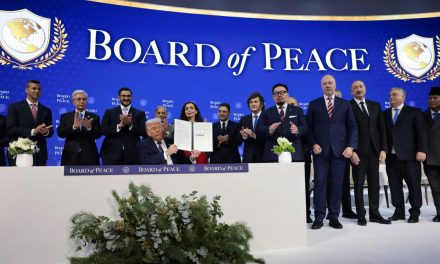
General Says War with China in Less than Two Years

General Mike Minihan, head of the Air Force Air Mobility Command, recently suggested in a memo that the United States and China would be at war in 2025. He said he hoped he was wrong, but that is what his “gut” is telling him.
Calling that prognostication alarming is an understatement – but is it credible? Would the two strongest militaries in the world actually engage in an all-out military conflict? Or is the General engaging in hyperbolic fearmongering?
To answer that question, we need to look at the prospect from two sides – what would create the conditions for war and what would prevent such a declaration?
Why War?
There are two issues that most observers see as conditions for a military conflict with China. The overarching issue is the competition between the two nations for world leadership – political, diplomatic, economic, and, of course, militarily. At some point, the competitors would have to fight to be king of the mountain.
The wick that could light that powder keg is Taiwan. China wants to bring the island under its control as a province – which it once was. The United States is pledged to support Taiwan’s current quasi-independent status.
Beijing has some legacy to its claim. Even the United States maintains a “one China” policy – suggesting that Taiwan is part to China. Taiwan is not a recognized nation. That is why they are not in the UN or only participate in the Olympics under Chinese sponsorship. Most nations do not have ambassadors in Taipei.
To believe a war between the United States and China is possible, you have to believe that China will eventually invade Taiwan. That is not at all a certainty – and the reasons not to invade outnumber the perceived benefits of an invasion.
But there are other contentious issues between Washington and Beijing. A major one is control of the South China Sea. China claims hegemony over most of it, although the world of nations sees it as open waters. China has undertaken provocative actions – building islands and harassing ships traveling through the Sea.
Defeating the United States in a shooting war would certainly establish the authoritarian regime in Beijing as the supreme world power – something that motivates President Xi Jinping. But is that where he is heading?
There is no doubt that China is building a very powerful military. They most certainly intend to be the most powerful nation on earth – and they are proving to be a strong competitor for the title. But China’s economic muscle depends on … stability. Businesses do not invest in places where the future is not reasonably predictable or the environment is hostile. It was once said that the United States has never gone to war with a nation that has Mcdonald’s. It makes the point, but that may not always be the case.
Why No War?
To imagine a direct conflict between the United States and China – as opposed to a proxy war in some region of the world – you have to ask where that war would be fought. However such a conflict starts, it is impossible to believe that it would not mean direct attacks on both nations – horrendous deadly attacks. America had a hint of that on 9/11, and China suffered the invasion by Japan in World War II.
Such a direct war could easily lead to nuclear attacks – perhaps even likely. Neither side would win without enormous carnage on both sides. In a real sense, it would be a Pyrrhic Victory for the winner.
A war between the United States and China could not be limited to a bilateral battle. It would swiftly lead into a world war. In that context, the United States would have the advantage. Virtually all the major nations – with significant militaries – would be on the American side. That would include NATO – the third most powerful military force in the world – and a number of non-NATO allies, such as Japan, South Korea, Australia, and Israel. Most of the world’s nuclear power rests in western nations. Also, several Southeast Asian nations – which fear an all-powerful China and oppose Beijing’s control of the South China Sea – are likely to join the western alliance – such as Vietnam.
China’s only nuclear allies would be Russia, Iran, and possibly a future North Korea. Nuclear nations like India and Pakistan would likely stay neutral – and if they did not, they would not likely align with China.
In terms of Taiwan, China is in a better position with the current situation than it would be in a war. First of all, an invasion of Taiwan will not sit well with the Chinese people. They share family and business ties. The people of China do not see the Taiwanese as their enemies.
Yes, China is building a powerful military – but does that portend a plan to launch a world war? It is likely more of a defense issue – and a cudgel of intimidation. The threat of war – especially nuclear war — can be a powerful influence in diplomacy and proxy wars – as we have seen in Ukraine. But you have to have a huge army with which to intimidate.
Summary
With all the facts on the scale, the idea of an American/Chinese war seems to be remote. Perhaps not impossible, however. Nations do not start wars that they believe they cannot win. They may not always be right, but they start with the belief. Hitler and Putin are good examples.
It should be noted that General Minihan’s “gut feeling” is not shared by the folks at the Pentagon. A Defense official said, “These comments are not representative of the department’s view on China.”
Defense Secretary Lloyd Austin said that he seriously doubts that current Chinese military activities near the Taiwan Strait were a sign of an imminent invasion of the Island.
I tend to agree – and am inclined to think that Minihan’s communication was wrong and reckless.
So, there ‘tis.





























Better to be nervous, wary, and prepared than sit back fat, dumb, and stupid like the Biden regime would prefer to do.
There are only so many ways to do things:
– you can do the right thing, the right way or the wrong way
OR
– you can do the wrong thing, the right way or the wrong way.
No matter what, this fool did it the wrong way and, at minimum, he is off to the penalty box for retraining and to have his head reshaped.
“I tend to agree – and am inclined to think that Minihan’s communication was wrong and reckless.” I will see that “tend” and raise you a “most certainly.”
I am sure he expected this to be internal and it became public, but he should have known better, if it he turns out to be spot on, which I doubt. A teachable moment, but ouch. The Chinese will love this for propaganda.
My opinion? General Minihan may be a fine military man, but he should have his butt kicked for throwing his opinions to the wind. His public statement brought us just one degree closer to a war. It was unthinking, dangerous and stupid.
I don’t think that CHINA wants to get into a SHOOTING war with the U.S. . . . It KNOWS better, to it’s OWN demise.